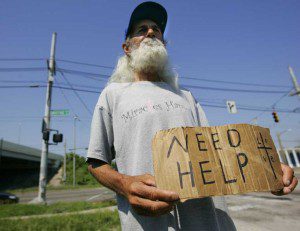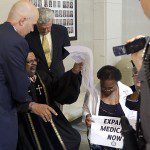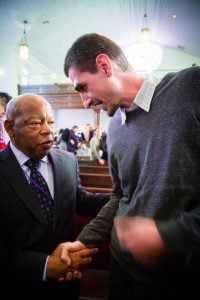 Our fair city has decided to make it illegal to be a beggar in Durham’s chief shopping districts. Here’s an excerpt from the news story:
Our fair city has decided to make it illegal to be a beggar in Durham’s chief shopping districts. Here’s an excerpt from the news story:
A unanimous City Council has approved a rules change that bars roadside solicitors from working on the medians of Durham’s major roadways.
The solicitation ordinance passed during Monday’s meeting as part of the council’s consent agenda. Neither it nor any of the other items on the consent agenda sparked any debate….
The ordinance limits solicitors to sidewalks. It’s intended to prohibit from-the-median approaches to motorists in places such as the U.S. 15-501 and Fayetteville Road corridors.
Said corridors are the avenues to South Point Mall and New Hope Commons, where I often go with my family to visit the Barnes & Noble bookstore.
I get it: no one wants to be reminded of someone else’s need when they’re on their way to buy a plasma screen TV or a new pair of jeans. I’d be happy to just enjoy a good book myself.
But I’m a Christian. And our Lord, along with his saints, says that if we have two coats and our neighbors are cold, then we’re the criminals–not them.
If you have two shirts, give one to the poor. If you have food, share it with those who are hungry.–Jesus
You with a second coat in your closet, it does not belong to you. You have stolen it from the poor man who is shivering in the cold.—St. Basil
With renewed devotion, then, we must serve the poor, especially outcasts and beggars. They have been given to us as our masters and patrons.—St. Vincent de Paul
The church hasn’t been great at “ending poverty”–or, for that matter, living up to the sort of example the saints point toward. But our record is pretty clear on this: it is no crime to be poor.
Some will say that I’m being imprecise–that this law and others like it do not make it a crime to be poor.
But anti-vagrancy laws have been part of American public life since the 18th century. We have, time and again, tried to hide the poor by criminalizing their public appeals in one way or another. And these laws have always been resisted by that tradition of people from all faiths who believe that the beloved community is possible.
As uncomfortable as they may make us feel, we cannot get rid of our homeless neighbors by outlawing their existence. “The poor you will always have with you,” Jesus said–not as a concession to inevitable inequality, but as a charge to remember Torah. Rabbi Jesus expects us to know how the verse ends: “The poor you will always have with you, therefore be open handed to them.”
If I’ve learned anything from a decade of living at Rutba House, it’s that Christian hospitality is about all of our needs. The beggar needs money; the homeless need homes. (They often need much else besides.)
But I also need them. We each need them because we cannot be saved without them.
John Chrysostom said, “But none can rescue you from hell, if you obtain not the help of the poor.” From my own experience, I don’t think he was touting some sort of spiritual dependency on someone elses need. He was pointing us toward the heart of Jesus’ message.
We are saved by grace, rich and poor alike. But we are saved from self-destruction to participate in a family where whoever gathered much will not have too much and whoever gathered little will not have too little because each of us will have according to our need.
To criminalize the poor is not only to harm our most vulnerable neighbors. It is to endanger the soul of our city.
And that is something we should all stand against.
To sign a petition asking Durham City Council to repeal this ordinance, click here.











